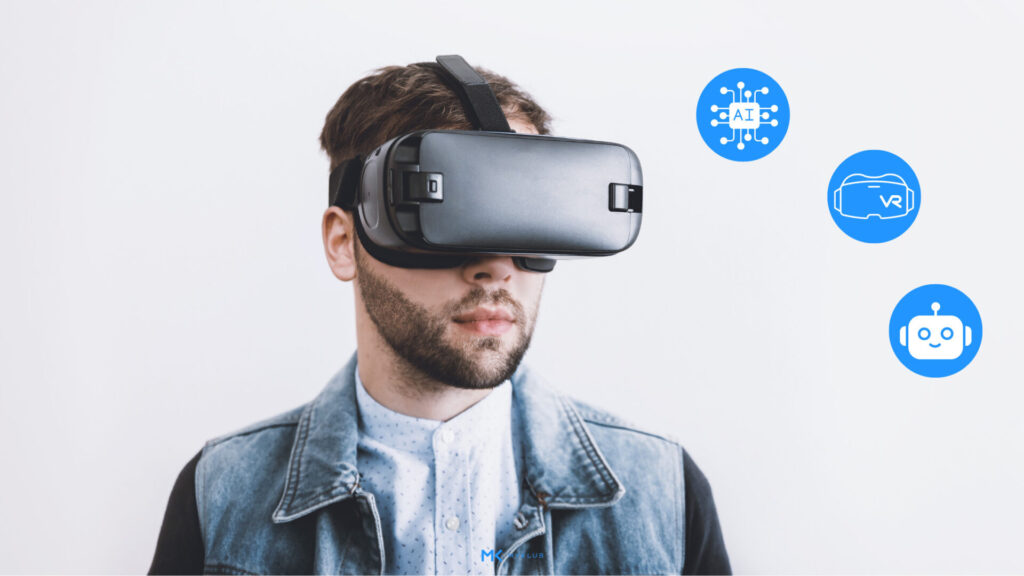In this article, we will discuss the key aspects of new technologies. What are the potential applications, usage scenarios, and associated limitations and challenges? We will highlight technological innovations and their impact on our daily lives. While highlighting the obstacles to overcome for optimal use. Dive with us into this panorama of trends, where ingenuity and pragmatism meet to shape the future of our connected society. Stay on the lookout for our in-depth analyses, intended to shed light on the challenges of tomorrow. Today the subject of Artificial Intelligence in e-Learning is becoming more than topical!
Table of contents
TogglePotential applications
Technological innovations
Artificial intelligence (AI) is revolutionizing the world of technology. Some of the most notable innovations include voice assistants, self-driving cars and personalized recommendation systems. AI also helps improve production processes through robotics and automation.
Also, AI is used in software and application development. Machine learning algorithms help learn and improve application performance based on user preferences and behaviors.
Sectors of activity concerned
Artificial intelligence affects many sectors of activity, such as health, finance, education and transport. In healthcare, AI is used for diagnosis, research and patient monitoring. For finance, AI can help with fraud detection, risk management and data analysis.
In the education sector, adaptive learning systems based on AI make it possible to adapt teaching content and methods to the needs of students. Finally, in transport, AI is involved in the development of autonomous vehicles, traffic management and predictive maintenance.
Concrete usage scenarios
Examples in daily life
The applications of AI in everyday life are growing. For example, voice assistants such as Alexa or Google Assistant are great for getting information quickly. They allow you to manage your connected home or listen to music.
Personalized recommendation systems, such as those used by video streaming platforms (Netflix, YouTube), offer content tailored to your tastes and consumption habits. And if you use a navigation app like Waze or Google Maps, you're already taking advantage of AI to optimize your journey and avoid traffic jams.
Perspectives of evolution
In the years to come, artificial intelligence will continue to develop and integrate into our daily lives. The democratization of virtual and augmented reality, the rise of connected objects and the automation of repetitive tasks will change the way we work, entertain ourselves and communicate.
Moreover, AI could play a key role in the fight against climate change. Yes, by optimizing the management of energy resources and allowing the development of more ecological and sustainable solutions.
Application limits
Performance issues
Despite the progress made, artificial intelligence still has certain limitations in terms of performance. Indeed, machine learning algorithms require large amounts of data to be effective. And deep learning models are particularly complex and resource-intensive.
Also, the AI can sometimes give wrong or biased results. Especially when the training data is not representative of reality.
Ethical aspects to consider
Indeed, the use of AI also raises ethical questions. For example with regard to privacy, surveillance and liability. The collection and analysis of personal data can infringe the privacy of individuals. And facial recognition or ad targeting algorithms are sometimes misused.
As for the question of responsibility, it is difficult to determine who is responsible in the event of a problem or accident involving an AI. Is it the designer, the manufacturer or the user?
Challenges to overcome
Security issues
Artificial intelligence presents significant security challenges. AI-based systems can be vulnerable to computer attacks. It is therefore essential to develop protection and resilience mechanisms to preserve data integrity and confidentiality.
Additionally, AI can be used for malicious purposes, such as creating deepfakes or automating cyberattacks.
Adaptation to regulations
AI regulations are being developed and changing rapidly. Companies and researchers must adapt to these new requirements, particularly in terms of data protection, transparency and accountability.
It is also important to promote an ethical and responsible approach to AI. This is possible by taking care to avoid bias, respect privacy and prevent discrimination.
Solutions for Obstacles
Innovative approaches for Artificial Intelligence in e-Learning
To overcome the obstacles related to AI, it is necessary to innovate and explore new approaches. For example, the development of federated learning models helps preserve data privacy by keeping it on the user's device, while improving AI performance.
Moreover, research on hybrid approaches, combining machine learning and symbolic reasoning techniques, could lead to the creation of more robust, transparent and explainable AI systems.
Collaboration between actors
Collaboration between players in the world of AI is essential to meet the challenges and find solutions to the problems encountered. Companies, researchers, governments and civil society must work together to define ethical standards, develop secure technologies and create an appropriate regulatory framework.
Initiatives such as OpenAI or the Partnership on AI testify to this desire for cooperation and exchange.
In conclusion, artificial intelligence offers incredible opportunities and has the potential to transform our daily lives. However, it is essential to take into account the limitations and challenges associated with this technology to make the most of it and ensure its ethical and responsible use. So take the time to think about how to integrate Artificial Intelligence in e-Learning.
- Source : The artificial intelligence revolution, Yann LeCun and Cédric Villani, Odile Jacob, 2018
- Source : AI, ethics and society, Luc Julia, First Editions, 2020





